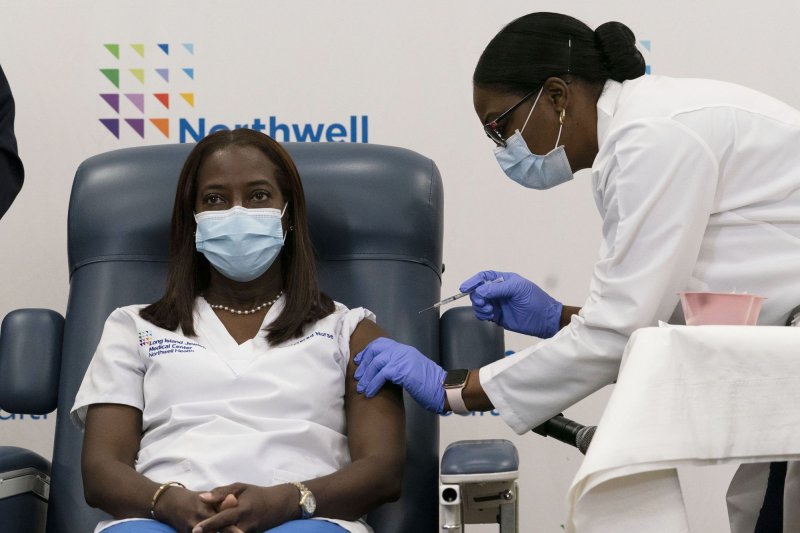1 of 6 | Sandra Lindsay (L), a nurse at Long Island Jewish Medical Center, is inoculated Monday with the COVID-19 vaccine by Dr. Michelle Chester in New York City. Pool Photo by Mark Lennihan/UPI |
License Photo
Dec. 14 (UPI) -- The United States hit the grim milestone of 300,000 coronavirus-related deaths Monday as a New York City nurse became one of the first American recipients of a new COVID-19 vaccine from Pfizer.
Nearly 1,400 Americans died Sunday, pushing the U.S. total since the start of the pandemic to 300,490, according to a running tally kept by Johns Hopkins University. The United States averaged 2,400 daily deaths last week, surpassing the 3,000 mark twice for the first time.
Death totals are usually lower on Mondays, reflecting delays in collecting data during weekends.
Meanwhile, 191,000 new infections were confirmed on Sunday, down from Friday's all-time high of 232,000 but still well above the two-week average of 166,000, according to health news website Stat.
The latest figures boosted the total U.S. caseload since March to 16.51 million, the Johns Hopkins data showed.
The number of Americans hospitalized with COVID-19 set a new record for the 17th consecutive day, rising to 109,000, according to the COVID Tracking Project.
Amid the worsening pandemic, the first vials of a vaccine made by U.S. pharma giant Pfizer and its German partner BioNTech arrived at healthcare facilities across the country.
Dr. Anthony Fauci, the nation's top infectious disease expert said Monday that the United States should achieve "that umbrella of herd immunity" by late spring or early summer of 2021.
"By the time we get to the fall, we can start approaching some degree of relief where the level of infection will be so low in society we can start essentially approaching some form of normality," Fauci told MSNBC.
An intensive-care nurse at Long Island Jewish Medical Center in New York received the first vaccine administered in the state, and perhaps the country, Monday morning as Gov. Andrew Cuomo watched via remote video feed.
Before nurse Sandra Lindsay received the shot, Cuomo praised the efforts of frontline responders in battling the pandemic.
"I know how horrific it was [for healthcare workers], it was a modern-day battlefield," he said. "That's why the word 'hero' is so appropriate for what you did."
Applause broke out after Lindsay was inoculated.
However, even as he celebrated the beginning of the "largest vaccination effort in the history of New York City," Mayor Bill de Blasio warned that a total lockdown might be necessary before the vaccine can make a difference.
"It's not just a shot in the medical sense, it's a shot of hope," he said in a daily briefing, "but we have to keep fighting this virus in the meantime."
Indoor restaurant dining in the city was banned beginning Monday by a order issued last week by Cuomo, but de Blasio indicated even stricter measures may be in the offing due to "really worrisome" increases in hospitalizations and the rate of new infections.
"The governor said we should prepare for the possibility for a full shutdown, I agree with that," he said. "We need to recognize that that may be coming, and we need to get ready for that now."
Just hours after Centers for Disease Control and Prevention Director Dr. Robert Redfield approved the vaccine to be administered to patients on Sunday, trucks carrying nearly 185,000 vials left Pfizer's facility in Kalamazoo, Mich.
The first batch of vaccines arrived at the Los Angeles International Airport via Federal Express, airport officials said.
"This is a major milestone for science, our country and our community," they said in a tweet. "Thank you to all those who made this delivery possible, and are part of the incredible effort to distribute vaccines around the world."
The initial vials of the vaccine also arrived in Canada late Sunday, Prime Minister Justin Trudeau announced.
"This is good news," he wrote on Twitter. "But our fight against COVID-19 is not over. Now more than ever, let's keep up our vigilance."
In Texas, which reported 6,500 new cases and more than 100 deaths Sunday, 109 medical facilities were awaiting the first allocation of 1.4 million doses earmarked for the state, officials said.
The initial 20,000 doses will arrive at four sites in Houston, Austin, Dallas and San Antonio. Another 75,000 doses will be arriving at 19 sites in 12 Texas cities on Tuesday.
Hospitals at Ohio State University and the University of Michigan were also expecting to receive their first does early Monday, officials told CNN.
In other COVID-19 developments Monday:
- A bipartisan group of lawmakers plan to introduce their $908 billion COVID-19 relief bill. House Speaker Nancy Pelosi and Senate Democratic leader Chuck Schumer back the bill, which calls for $288 billion in small-business support and $180 billion for extended unemployment insurance. Senate Republican leader Mitch McConnell opposes the measure.
- In a case that could have implications for the rollout of the COVID-19 vaccine, an employee has filed a complaint against the University of Virginia Health System for refusing to exempt him from getting a flu shot that he believes would "defile the body as the temple of the Holy Spirit."
- A Texas Boy Scout troop is helping residents at a nursing home get a little closer to their visitors with a "hug booth." It's designed with a plexiglass window that allows guests to stick their hands through large, sanitized gloves for hugging and other physical touches.















